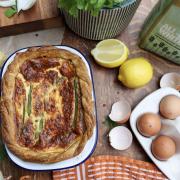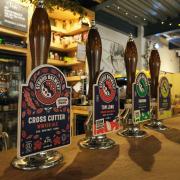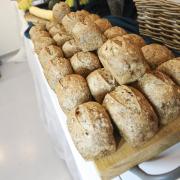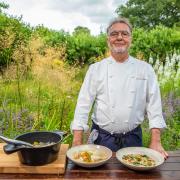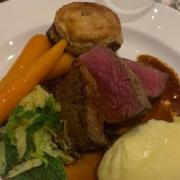Fourteen pubs a week are shutting their doors, but is there still a living to be made from being behind the bar? Katie Jarvis went along to an Arkell’s open evening to find out

Swindon: the rush hour. Jam-packed vehicles buzz like a swarm of angry wasps, while harassed motorists - weary hands on irritated horns - daydream of sinking into their usual pew in the local. Traffic might not be flowing but - in their mind's eye - the beer is. A honeyed pint of nectar streaming steadily from a polished brass tap.
Inside the Grape and Grain - the Arkell's beer, wine and spirit warehouse just off the teeming A419 - there's a different kind of dream taking shape.
Several couples, a lone chap, a mum who's left her husband babysitting the kids; they're the latest bunch of hopefuls - some nervous; others exuding determination and purpose - ready to talk about their ambition: becoming the landlord who pulls all those soothing pints.
It's two years since Arkell's last held an open event for people interesting in running one of their pubs. Today, this family company has four landlord positions on offer - at the Village Inn, Liddington ('country pub, popular with all ages'); the Freke Arms, Swanborough ('gastro pub'); the Rose & Crown, Ashbury ('family- and dog-friendly'); and the Kings Arms, Malmesbury ('set in historic country town').
In 1903 - as listed in Kelly's Directory - a certain Henry Jones was landlord of the 17th-century Kings Arms. So well-known was old Harry, you could write a letter from anywhere in the world, mark it 'Wiltshire', and (as long as you put a sketch of this distinctive character on the envelope) it would unerringly find him: "A veritable John Bull and the embodiment of the spirit of Charles Dickens".
Harry would regularly be found around town, chatting with locals and visitors, or presiding over a posh hunt dinner. And the pub (either in hope or expectation) met - with coach and fine horses - every train that chuffed into the town station.
He's long gone - Harry, in his top hat and tails. But his principles live on, easily recognisable to landlords today.
"Interaction. That's what makes a good pub landlord or landlady," Laura Medlam says. "You can't leave it all to staff. The customers want to see you."

She's in the queue, keen to speak to an Arkell's representative (among them, Julie Crew, recruitment manager; Alun Rossiter, well-established Arkell's landlord; and George Arkell himself, genial brewery MD) about a long-held desire to run her own pub. Laura's no newbie - she's worked for Arkell's since she was 17. Started off waitressing; progressed to the bar; then a hot seat, cooking in the kitchen. Took time off to have children, and now works at the Bakers Arms in Stratton, where the Sunday roasts are legendary. If she wants to progress further, she needs her own pub.
Surely the hours can't be ideal for a parent?
She half-shrugs: the hours come with the territory. "They're not great. Though - if you work it right - it suits," she says. "But it's the meeting of new people that I like. And every day is different; every day is a challenge."
Laura's no idle dreamer. She waited until her children nudged secondary-school age - "I didn't want to do the whole buggy thing in a pub" - before sitting down and putting figures on paper; talked it over with her husband - "He wouldn't be involved in the everyday but he'll get dragged in!" - and took a deep breath. "You have to be completely realistic and committed. I've seen really bad days when a pub fills with police because a fight has kicked off. It's not your fault but it can ruin a reputation.
"And then there are really good days. If I go home happy, customers have gone home happy. The important thing is to get people through the door: promotion; social media; word-of-mouth; good people who run it and work in it.
"Obviously, the supermarkets are so cheap now. You need people to stop buying that crate and get in your pub."
She's seen other changes, too. More teenagers; fewer old-timers. "In every pub, there's a corner of characters who make you laugh - but there's getting to be less and less in that corner now."
She smiles affectionately. "I remember Don, who worked for Arkell's. He used to come in all the time, bless his heart. He died two years ago."

**************
In 1830, the Beerhouse Act threw wide open the brewing and selling of beer to every Tom, Dick and Harry for the modest one-off payment of two guineas. The idea was to wean the public off the hard stuff by lowering the price of a good old pint. Its success was a moot point; but the result was the springing up of around 30,000 new 'pubs'. You could barely stagger through a village street in England without sprawling over a kitchen counter selling a jar of its best.
In 2019, the picture couldn't be more different. Since the 60s, at least, the great British pub has been in decline. Changes to the way we live; more choice in where we do our drinking; the smoking ban; prohibitive 'pub' taxes… The reasons are legion.
But there's no arguing with statistics. The most up-to-date figures from CAMRA (Campaign for Real Ale, Feb 2019) show 14 pubs are permanently slamming their doors shut each week. Unsurprisingly, CAMRA's Save Our Pubs campaign is demanding urgent action. What would help, it says, is reducing sky-high business rates (on which the last budget brought limited movement); forcing better deals for tenants from big-business owners; and lowering the beer-duty pubs have to pay - a tax the Government would be free to review after Brexit.
But is all flat on the beer front?
Absolutely not. George Arkell, MD of the family brewery, says there's still a good living to be made from a well-run pub - though it's not for the fainthearted. He should know: Arkell's (one of just 29 family breweries left in the UK) has 100 pubs across Wiltshire, Gloucestershire, Oxfordshire, Berkshire and Hampshire, which they run both as managed houses (a great way to learn the ropes) and tenancies.
"It is a big undertaking, in this day and age," George admits. "You can't live on drinking alone." Gone is the halcyon period when pouring a simple pint for grateful regulars-and-their-spaniels guaranteed you success.
"Nowadays, the majority of our pubs have to have a second income-stream: good food, weddings, letting rooms. It is hard work. You're living above the shop. But it's really fun, at the same time. You're at the heart of the community, if you're running a pub. You hold christenings, weddings; you're giving people Sunday lunch. You're there when their football team wins and when they lose. You're involved in every aspect of their lives.

"Don't snigger!" he banters, as Alun Rossiter - one of his most loyal landlords - raises a humorous eyebrow across the table.
These men both defy 'pub' stereotypes, in their own ways.
George is public-school educated - boarded at Shiplake; fully admits to having grown up in a bubble of privilege. But, like most of his family (his brother, Alex, is Arkell's head brewer) he's not afraid to get his hands dirty. He didn't have to join the family firm - the choice was his; but, 21 years ago, fresh from uni, he stuck his hand up and got sent to Daniel Thwaites, a brewery in Blackburn, to do a pupillage in running pubs. "I started behind the bar and did their relief circuit."
Alun breaks moulds in a different way. He and his wife, Julie, run the Southbrook Inn on a franchise system (it runs like a managed house, but the Rossiters pay the staff-wages). With four children, aged from 17 down to "a pleasant surprise" aged five, life is beyond hectic.
"But I've still got a hell of a social life - even I don't know how I fit it in," he chuckles. "I'm a Swindon speedway team manager; I'm Great Britain team manager. Also, I run an under-11s football team on the weekend. You need a life away from the pub."
He and Julie make sure they get away each Monday, visiting different pubs in the area while the kids are at school. "It's a way of keeping your sanity. It's very demanding when you're married - I run the bar and she runs the kitchen - and you're on top of each other."
What happens if they have a row?
"I just switch off. I've been doing it long enough now. We've been married 25 years."

He's a details man: clean tables, sparkling glasses; checking beer-lines. You won't find Alun forgetting to salt the dishwasher. "Otherwise, you get a film over the glasses and they look terrible."
But running a pub is far more than cook-and-bottle-washing. "You're a doctor; you're a nurse; you're a psychologist. People tell me unbelievable things. Recently, we had a lady have a massive heart attack in the pub. We ended up on the front page. My barmaid knew what to do and kept her alive until the paramedics came."
*************
The room is filling with a steady flow of would-be applicants, all closely scrutinised by a beneficently whiskered John Arkell, who stares out from his portrait on the wall. This was his family farm, back in the day, golden fields of waving barley covering where grey tarmac now lies. In 1843, John began brewing beer (in much the same way his company brews still today). But he had a revelation. He'd also buy his own pub from which to sell it: the Kingsdown, just over the road.
When Brunel passed through, Arkell's bought one of his engines - and, suddenly, they were steaming ahead of the game.
He'd approve of innovation, would John Arkell. The sort of innovation two of Arkell's latest pub managers - Will and Ayesha Rowe - exemplify. They took over the Riverside in Lechlade - "Five months! It's gone very quick!" - and they've all sorts of ideas brewing.
"When we were interviewed, one of the questions was: If you could pick your own pub, what would your vision be?" Will says. "We answered food-led, but also innovative on the bar: cocktail masterclasses; things that are a little bit different. Group of 10 girls. Cool bartender. Beer-tasting; gin-tasting…"
"Food-pairing with beers," Ayesha throws in.
They're into food with a passion. Last year, they bought a white Citroen van and toured festivals, from Scotland to Wales, selling waffles. "It was 24/7 but we enjoyed it; we were working together."
"People say it's weird, working together; but I'd find it weird if I didn't see him every day."
At the end of festival-season, they enjoyed a short break - until restlessness kicked in.
"I literally put a few applications out and got a bit of comeback from Arkell's," Will says. "Everything just fell into place. Whereas a lot of places, you have to fit their criteria; you've got to do their food. At the Riverside, we're able to put our own stamp on things."
It's been a baptism of fire, taking over an established pub. But they're a good team: Will's a numbers man; Ayesha's the creative.
Devising a menu has been the first challenge. It's a relatively small kitchen, but they were determined to cook everything fresh and from scratch. The locally-sourced steak-burger - from Andrews in Highworth - has been a particular hit.
"I bought 100 this week alone. I'm supposed to pick some up today."
What's surprised them most?
"The kindness of the locals," Ayesha says. "Everyone said, 'You'll have to get them on board!'; but so many have popped in and introduced themselves. The ladies in the post office are lovely!"
The biggest hurdle - and it's industry-wide - is staffing. Getting - and keeping - a consistent team who work to a manager's standards.
"And, do you know what? The first month, I worked every single day, six in the morning until midnight. We've kind of got it now where we can have a full day off and a half. But you're always on the end of a phone. You are always on call."
"You've got to love it," Ayesha adds. "Our most common phrase is, 'Let's stop talking about work!'"
Is there not an obvious danger here? A stressful job with a fully stocked bar?
"It's almost the opposite," Ayesha says.
"I can't remember the last time I had a beer. Too busy."
"My friends think it's weird that I never drink. And I think it's weird that they have to have a drink every night. I'm at the point where I think: I've got to get up at 7; I just want to put my feet up, watch some TV, eat my dinner."
************
So what is the future of the great British pub?
Optimistic, says Ollie Beardsley. At 25, he's already an old hand: manager of the Old Fleece at Rooksmoor, Stroud - one of three pubs owned by his dad, Nick, and business partner, Christophe Coquoin. In fact, when Ollie took over the pub - aged 18 - he was the youngest landlord in the country.
Ollie's advice?
Stay ahead of the game. Look for the next trend - gin, gluten-free, vegan...
And, above all, don't think about how many UK pubs there aren't - think about how many there are: 48,000 of them.
"I drove back from Poole to Stroud the other day and I can't tell you the amount of pubs I passed," Ollie says. "If you've got that many, they're not all going to survive. But as long as they good ones do, that's important - and, if you run one, make yours one of the good ones."
Advice from the top shelf….
1. Running a pub as a tenancy or on a lease is a low-cost entry into running your own business, and a great way to learn the ropes. You'll end up with a better understanding of how that business works and whether it's the lifestyle for you.
2. There are lots of pub companies - from Hook Norton in Oxfordshire, and Donnington in the North Cotswolds, to bigger national ones such as Punch, Ei and Admiral Taverns. Look at what they offer and make sure you have a really good discussion with them about what might work for you.
3. If you're going to run a pub on a tenancy or lease, there'll be lots of sound advice available from your pub company. Use that advice - they know all about running pubs!
4. Take time to understand the market: the kind of pub that works in your particular location. It's no good just saying, 'I'll run it in the same way as the one down the road' because you'll end up with two in competition.
5. Gone are the days when you can simply expect people to walk through the door. You need business and technical skills; you need to understand how stock works; where your gross profit is going to be; how to work with your local licensing officers. You need knowledge of marketing, social media, how to attract people to your pub, how to get them to return.
6. Are you going to be more drinks-led or food-led? There are still pubs that are only drinking places, but they tend to be in town centres. Fine dining also has its place - 17 pubs in this country are Michelin starred.
7. People are looking for experiences; for something unique. It might be that you put in a game - a pool table or shuffleboard - if you have room. Other pubs focus on showing sports on TV; last year's World Cup attracted people in their thousands to their local.
8. Events are increasingly popular - music nights, pub quizzes - not to mention hosting everything from marriages and wakes to mother-and-baby activities. People can also forget that pubs raise huge amounts for charity - over £100 million a year.
9. Think about tourists! One of the top three things to do for an overseas visitor when in the UK is a trip to a pub. They're a uniquely British experience, and often in special buildings architecturally and historically.
10. Sign the petition to cut beer tax and help pubs, Long Live the Local. We've been really quite successful over the past few years in getting the Government to freeze or cut beer duty to help pubs. Last year, 114,000 people signed up and 48,000 wrote to their MPs. And it's still ongoing.
For more information, visit beerandpub.com; sign the Long Live the Local petition at LongLivetheLocal.pub.






